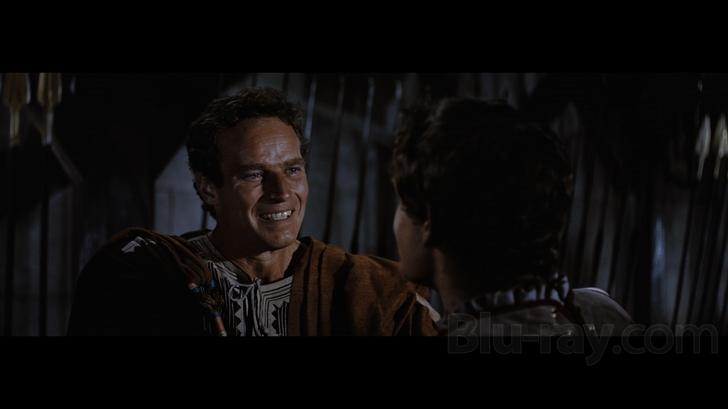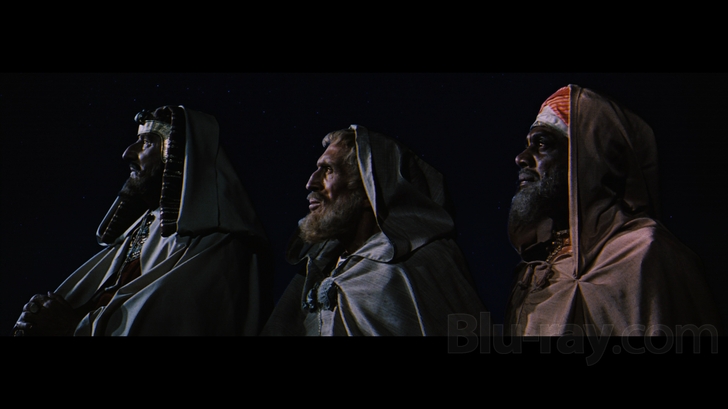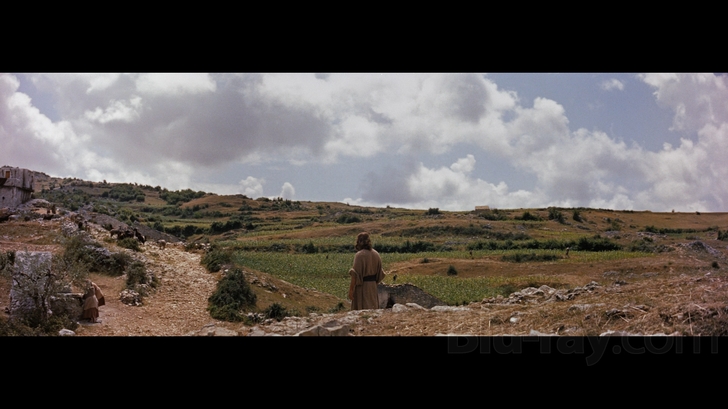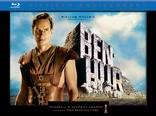Ben-Hur Blu-ray Movie
HomeBen-Hur Blu-ray Movie 
Ultimate Collector's EditionWarner Bros. | 1959 | 222 min | Rated G | Sep 27, 2011
Movie rating
8.7 | / 10 |
Blu-ray rating
| Users | 4.9 | |
| Reviewer | 5.0 | |
| Overall | 4.9 |
Overview
Ben-Hur (1959)
Judah Ben-Hur, a Jewish nobleman in 1st-century Jerusalem, is unwittingly thrust into an heroic odyssey, finding himself and his family enslaved by the Romans, placing him on a path for a fateful encounter with Jesus Christ and to ultimately face his tormentors during a furious chariot race. Filmed in MGMCamera65 (UltraPanavision)
Starring: Charlton Heston, Jack Hawkins (I), Haya Harareet, Stephen Boyd, Hugh GriffithDirector: William Wyler
| Drama | Uncertain |
| Epic | Uncertain |
| History | Uncertain |
| Period | Uncertain |
| Biography | Uncertain |
| Adventure | Uncertain |
| Action | Uncertain |
Specifications
Video
Video codec: MPEG-4 AVC
Video resolution: 1080p
Aspect ratio: 2.76:1
Original aspect ratio: 2.75:1
Audio
English: DTS-HD Master Audio 5.1 (48kHz, 24-bit)
French: Dolby Digital 5.1 (448 kbps)
Spanish: Dolby Digital 5.1 (448 kbps)
Italian: Dolby Digital 5.1 (448 kbps)
German: Dolby Digital 5.1 (448 kbps)
Portuguese: Dolby Digital Mono
Czech: Dolby Digital Mono
Hungarian: Dolby Digital Mono
Polish: Dolby Digital 5.1
Music: Dolby Digital 2.0
Isolated music track DD 2.0 48kHz@192kbps Surround encoded
Subtitles
English SDH, French, German SDH, Italian SDH, Portuguese, Spanish, Croatian, Czech, Danish, Dutch, Finnish, Greek, Hebrew, Hungarian, Icelandic, Korean, Norwegian, Polish, Romanian, Russian, Swedish, Thai
Discs
50GB Blu-ray Disc
Three-disc set (3 BDs)
Packaging
Slipcover in original pressing
Playback
Region free
Review
Rating summary
| Movie | 5.0 | |
| Video | 5.0 | |
| Audio | 5.0 | |
| Extras | 4.5 | |
| Overall | 5.0 |
Ben-Hur Blu-ray Movie Review
In a nutshell: wow.
Reviewed by Jeffrey Kauffman September 21, 2011A strange confluence of sociopolitical forces and technological innovations led to the 1950’s being the preeminent decade for epic Biblical dramas on film. As television made more and more inroads on the box office receipts of big screen fare from Hollywood, executives were desperate for a countermeasure to stem the tide. Perhaps that desperation put them in a prayerful mood, for stories from the Bible, or which were at least tangentially related to stories from the Bible, seemed ideally suited to a whole gamut of new technologies which were in themselves designed to lure people away from their miniature flickering black and white living room screens. Widescreen processes like Cinemascope and multi-channel recording techniques that at the very least offered two track stereo (and often much more than that) literally and figuratively surrounded the viewer with pomp and pageantry. But epic productions haven’t always been able to magnetically attract audiences, and there was something else at work in the fifties which was a symbiotic part of that decade’s ascendancy of Biblically oriented fare and the immense success it enjoyed. While the decade hadn’t yet erupted into the out and out nuclear fear that accompanied the Cuban missile crisis in the early sixties, when we actually did face nuclear holocaust, there can be no underestimating the psychological impact of the development of the hydrogen bomb and the Soviet Union’s surprisingly fast ability to “catch up” to the West in destructive capabilities. The anti-Communist paranoia also led to a culture intent on conformity and assimilation, one which seemed perfectly personified by the “grandparent” Presidency of Dwight D. Eisenhower. Part of that conformity was of course a conformity of belief and religious practice, and that no doubt helped to bring audiences to Biblical film dramas, as if attending these spectacles was a religious rite in and of itself. While Biblical dramas had of course existed from virtually the dawn of film, from The Robe onward, the fifties saw one gigantic production after another which sought to cash in on religious sentiment while making the most of widescreen framings and multi-channel sound design. It’s perhaps no mere coincidence that the apotheosis of this trend should have come at the decade’s end in 1959, with William Wyler’s mammoth Ben-Hur, which is of course subtitled A Tale of the Christ. While Biblical dramas certainly continued to be produced well into the sixties (and occasionally beyond), the luster was obviously off as early as 1961’s King of Kings, while at more or less the same time we faced nuclear annihiliation in the Cuban missile crisis less than stellar efforts like Sodom and Gomorrah were briefly visiting cineplexes. By the time The Greatest Story Ever Told and The Bible bombed in the mid-sixties, the handwriting was clearly on the wall, like some scribbled prophecy from the Book of Daniel. But everything that the fifties stood for and hoped to achieve in the genre of Biblical drama came together in, well, a miraculous fashion in Ben-Hur, one of the most eagerly anticipated Blu-ray catalog releases of this year, somewhat beyond the film's advertised "50th anniversary".

M-G-M was teetering on the edge of bankruptcy in the late 1950’s, despite prestige (and often very successful) releases like 1958’s Gigi. It was therefore a significant gamble when the studio put up the then unheard of sum of close to fifteen million dollars to underwrite the gargantuan production that Ben-Hur promised to be. It’s hard to realize now, given the vantage point of what the film has become since its release, that there were really no guarantees for Ben-Hur, despite its impressive pedigree and its previous success as both a stage play and a silent 1925 film. (It’s interesting to note that General Lew Wallace’s original source novel took a few years to really ignite, and it wasn’t until almost a decade after its initial printing that the book became an international sensation in the late 1880’s). But looking back now Ben-Hur, much like Gone With the Wind a generation earlier, was a prime example of the stars aligning more or less perfectly to create a mammoth spectacular that virtually oozed filmcraft from every frame.
It’s never totally safe to assume “everyone” has seen a film, but most are probably acquainted with at least the broad outlines of Ben-Hur. Heston portrays Judah Ben-Hur, a Jewish prince from the “wealthiest family in Jerusalem.” In the year A.D. 26, the Jews are obviously an oppressed minority in their own land under the thumb of Roman legions. Judah’s childhood friend, the Roman commander Messala (Stephen Boyd), returns to take charge of Jerusalem’s legions, and Judah hopes for a rapprochement which may help his people in the long run. Things get off to a promising (some have argued homoerotic) start, but almost immediately disaster strikes when Judah’s sister Tirzah (Cathy O’Donnell) unwittingly pushes some roof tiles off of their mansion which injure a Roman General. Messala reveals his true colors and iimprisons Judah, his mother and sister, soon spiriting Judah off to spend his life as a slave in the Roman galleys. On his way to his life chained below decks as an oarsman, Judah collapses and is bathed in soothing water by a mysterious carpenter’s son who seems to be able to magically restrain an arrogant Roman soldier simply by looking at him.
That sets Judah off on a series of adventures which end up with him saving a Roman Consul named Quintus Arrius (Jack Hawkins), which in turn leads to Judah’s freedom and actual adoption by Arrius, making Judah a Roman and someone with class prestige and power. That leads to a showdown between Judah and Messala in one of the most famous set pieces in the entire history of film, the chariot race which serves as the film’s iconic climax. This brief overview barely touches on any number of salient plot points and sidebars, including a great Oscar winning turn by Hugh Griffith as a lusty Arabian prince, and not the least of which is the intertwined story of what happens to Jesus during this period.
Ben-Hur in fact posits Judah as a Christ figure himself. He is a victim of fate, a martyr whose belief in Divine providence carries him through one ghastly event after another. While some may find the film’s subtext of a Jew saved by Christ at least modestly disturbing, the film’s evangelical outlook was no doubt perfectly in tune with the late fifties’ sentiment in which it was formulated. The film is inarguably reverential, sometimes just slightly comedically. Note for example the opening M-G-M logo, when the studio’s iconic mascot Leo is frozen and is not permitted to roar. This may be one of the few documented cases of Christians triumphing over lions. In other ways, though, Wyler beautifully crafts this “Story of the Christ,” never showing us Jesus’ face but making the character’s impact felt in virtually every frame of the story.
In one of the supplements included on this three BD set, it's mentioned that Ben-Hur may not have been the first epic by any stretch, but it was perhaps the first modern epic in that its story was motivated by character rather than events. And indeed Ben-Hur seems to presage the famous David Lean films that were to come which revisited epochal world events through the eyes of individuals. It's in that delicate balancing act between the intimate and the spectacle that Ben-Hur finds its most lasting impact, probably beyond even the film's inherent religious sentiment. As important as Christ's story is to Ben-Hur, it's Judah who remains the focal point and it's from him that the film derives its incredible emotional impact. That impact is still fully on display more than a half century after the film's release.
Ben-Hur Blu-ray Movie, Video Quality 

Wow. Just stop there and you basically have the gist of everything that can be said about Ben-Hur's astonishing—really breathtaking, and I mean that literally—debut on Blu-ray courtesy of an AVC encoded 1080p transfer in 2.76:1. Is there any other studio that has so lovingly gone back to its iconic catalog (albeit one that officially "belongs" to M-G-M) as Warner has? Once again the studio has returned to the original negative to source new high-res scans, along with a frame by frame restoration, to present this film in high definition, and to say the results are spectacular is something of an understatement. This well over three hour film has been wisely spread across two BD-50's, so kiss any latent fears of compression artifacts goodbye, especially since the bulk of the supplements are included on a third Blu-ray disc. Everything from the copious Roman foliage to the ornate grillwork in the Hur compound resolves perfectly, with precision and absolute accuracy. Colors are incredibly well saturated and those gorgeous Technicolor reds and purples are all that they should be. I came under some passing criticism for my review of Quo Vadis? on Blu-ray some years ago (for another site), but simply pull out that disc if you have it and compare the reds in that transfer to the reds in Ben-Hur and it instantly becomes apparent what a difference a careful transfer, including absolutely accurate telecine color timing, can make for a release. The film is also stunningly damage free, with nary a scratch, speck or other distraction in view.
True aficionados of Ben-Hur on various home theater media know that the film has routinely, if sometimes slightly, been misframed. We finally are offered the full glory of the M-G-M Camera 65 process (Camera 65 was a 70mm format that afforded 65mm for the image and 5mm for the magnetic audio tracks). Wyler worked hand in hand with cinematographer Robert L. Surtees to craft compositions which exploited the widescreen process and those artful displays of vast vistas are impeccably represented on this Blu-ray. Pay special attention to Surtees' expert use of focus, often in different parts of the frame, which also look spectacular in this high definition outing.
Previous trouble spots like aliasing and significant crush have all but disappeared in this new transfer. Shadow detail is often astounding. All sorts of information which was previously murky in such dank sequences as the nighttime scenes at the Hur compound or the bowels of the prison where Judah's mother and sister are held captive are now visible, from shiny rock surfaces to background matte paintings. In fact the increased resolution has one detriment, and that's that some of the admittedly gorgeous matte work as well as some of the miniatures (particularly in the sea attack scenes) are noticeably fake looking. Some of the process photography also shows its seams (literally), with fairly apparent haloing (not in the artifacting sense) around the foreground characters in front of the process backgrounds.
Ben-Hur instantly becomes the gold standard for what can be achieved in high definition restoration and transfers of catalog titles. While it perhaps may not be financially feasible to devote this much care and effort (not to mention copious moolah) to upgrade every catalog release to these standards, other studios (are you listening, Universal?) should take this new release of Ben-Hur as a sterling example of what can be accomplished if there is the necessary support and willpower.
Ben-Hur Blu-ray Movie, Audio Quality 

At the risk of sounding repetitive: wow. Ben-Hur has an absolutely glorious sonic component on this new Blu-ray courtesy of a flawless DTS-HD Master Audio 5.1 track. M-G-M has obviously kept the original stems and mag tracks of this film in more or less pristine condition, and it shows throughout this stunning lossless presentation. From the first boisterous moments of Rózsa's incredible Overture, the difference, especially with regard to the low end frequencies, is instantly audible and incredibly fulsome. The 5.1 track is gorgeously spacious, with excellent use of side and rear channels, especially in some of the film's most famous set pieces, including the galley scenes and of course the iconic chariot race, which is awash in LFE and incredible panning effects. Dialogue is perfectly placed around the soundfield and is always easy to hear, but on reflection, it's the unbelievably gorgeous Rózsa score which perhaps benefits most from this new lossless audio offering. Brass blasts from the speakers in alarming clarity, while strings sound brilliantly bright but never strident. Rózsa's evocative use of harps and other percussion is also incredibly well reproduced on this new track, adding a whole new luster to one of the most celebrated scores in the history of film.
Ben-Hur Blu-ray Movie, Special Features and Extras 

Once again Warner has assembled a very impressive and incredibly handsome package which provides a wealth of on disc supplements as well as other swag. The embossed box is enclosed in a slipcase (without the usual—and often problematic—fold around "Blu-ray" cardboard attachment). The three Blu-rays offer both previously released supplements as well as an all new documentary.
Blu-ray Supplements:
- Commentary by Film Historian T. Gene Hatcher with Charlton Heston. This previously released commentary is interesting if at times a little frustrating. Hatcher is a very genial host and has some good information to impart, but more than once he opts for less than insightful comments like, "Every time you see someone wearing red in this film, you know you're looking at the bad guys." Heston's comments, recorded separately and well edited into the commentary, provide a good deal more interest overall, as sporadic as they are. Perhaps drawing on the journal he kept (see below for more details), Heston's memories are quite vivid and offer a lot of background information about M-G-M's precarious finances circa 1958 as well as the several months Heston and family spent in Rome filming the epic.
- Music Only Track Showcasing Mikos Rózsa's Award-Winning Score. Even if you're not a big fan of isolated music tracks, this is one time you might want to make an exception. Rózsa, who built much of his late career in scoring epics like Ben-Hur, never wrote a more towering or affecting score than he did here, and it sounds incredibly sumptuous courtesy of the new lossless DTS-HD Master Audio 5.1 track. Rózsa is both incredibly vigorous and touchingly lyrical throughout this score and it remains one of the glories of mid-century film composition. One caveat (and potential disappointment): the score is presented in Dolby Digital 2.0, not a lossless audio format.
- Trailers (SD; 14:15)
- Charlton Heston and Ben-Hur: A Personal Journey (HD; 1:18:06). This beautifully made piece offers wonderful reminiscences by Heston's wife, son and daughter as well as a number of other people and helps to make Heston's personal life as captivating as his work in Ben-Hur. The documentary features a wealth of home movies, including some of Heston as a kid clowning around in his backyard, as well as a lot of 16mm footage Lydia Heston filmed throughout their marriage. One odd inclusion: Tom Selleck, who admits up front he never really worked with Heston (Selleck was a bit player in Midway, but that's their only film connection) and whose opinions, while certainly not horrible in any way, are not really necessary, especially when those who actually knew and worked with Heston are also included in the piece.
- Ben-Hur 1925 Silent Version (SD; 2:23:06). Yes, it's in standard definition, but this 1925 silent version of Ben-Hur is a spectacle to behold in and of itself, and it obviously acted as the template for Wyler's version, especially with regard to some of the set pieces like the galley scenes and the iconic chariot race. This is the restored version with two-strip Technicolor sequences and tinting intact, and it features a very nice score by Carl Davis.
- Ben-Hur: The Epic That Changed Cinema (SD; 57:46) is a decent if not overwhelmingly insightful documentary that traces the film's impact on the epic genre. While it's great to see and hear someone like George Lucas talk about how Ben-Hur influenced his filmmaking, that's balanced by the ludicrious comments of Elvis Mitchell, who gives us a laughable chronology, informing us all that "Before Mutiny on the Bounty, Lawrence of Arabia, Doctor Zhivago or Ryan's Daughter, there was Ben-Hur." Well, yes, Elvis, but before Ben-Hur there were little films like, oh, you know, The Robe, The Egyptian and The Ten Commandments, not to mention the 1925 Ben-Hur itself.
- Ben-Hur: The Making of an Epic (SD; 58:15) is a fairly standard making of piece, which includes a lot of background information, including on General Lew Wallace and the book, and which features interviews with a slew of people like the always reliable and informative Rudy Behlmer.
- Ben-Hur: A Journey Through Pictures (SD; 5:09) is a brief set of stills and storyboards set to Rózsa's stirring score.
- Screen Tests (SD; 29:18). Have you ever wondered what Frank Drebin—er, Leslie Nielsen—would have been like as Messala, here's your chance to find out. Keep an eye out for future I, Claudius star George Baker as Ben-Hur in one set of tests made for the British arm of M-G-M.
- Highlights from the 1960 Academy Awards Telecast (SD; 9:47)
- Newsreels (SD; 9:45) is an assortment of newsreels documenting the various premieres of the film, including Chuck chatting up customers at the boxoffice.
- Exclusive Production Art Book. This nicely illustrated 64 page hardcover book is printed on glossy stock and features a lot of great stills, character biographies, production art and reproductions of the original theatrical pressbook.
- Charlton Heston: The Ben-Hur Diaries. One of the most fascinating non-disc extras ever included in an Ultimate Collector's Edition, this 128 hardcover book is a replica of the journal Heston kept during and after the filming of Ben-Hur. It's a typical small diary, with dates on each page, and Heston's typed reminiscences at the bottom of each page, along with his schedule for the day. But stuffed inside this impressive journal are a wealth of other items, like photographs, ticket stubs and the like. Unusual and unusually interesting.
Ben-Hur Blu-ray Movie, Overall Score and Recommendation 

This release instantly becomes the "must have" catalog release of the year. Though some collectors bristle at the thought of these "Ultimate Collector's Editions" and their perhaps unneeded swag, this is one package that all but the most curmudgeonly should enjoy. Yes, it's big (about the same size as the "other" Heston mega-epic The Ten Commandments), but it's stuffed to the gills with great on-disc and extra-disc supplements, including the really innovative and fascinating Heston diary. The film itself is simply a reference quality example of what can be achieved with catalog releases and Warner is to be thoroughly congratulated for once again doing the right thing by one of its most iconic titles. It goes without saying Ben-Hur receives an enthusiastic Highest recommendation.
Other editions
Ben-Hur: Other Editions

Ben-Hur 4K
Collector's Edition | UK Import
1959

Ben-Hur 4K
1959

Ben-Hur 4K
Limited Edition
1959

Ben-Hur
Academy Awards O-Sleeve / 50th Anniversary Edition
1959

Ben-Hur
Ultimate Collector's Edition | with Figurine | 1959 and 1925 movies
1959

Ben-Hur
Diamond Luxe Edition
1959

Ben-Hur
50th Anniversary Collector's Edition
1959

Ben-Hur
Fiftieth Anniversary
1959
Similar titles
Similar titles you might also like

The Ten Commandments 4K
1956

Cleopatra
50th Anniversary Edition
1963

Wyatt Earp
1994

The King's Speech
2010

Spartacus 4K
1960

Master and Commander: The Far Side of the World 4K
2003

Braveheart 4K
1995

The Robe
1953

Becket
1964

Spartacus: The Complete Series
2010-2013

12 Years a Slave
2013

Rome: The Complete Series
2005-2006

Lawrence of Arabia 4K
60th Anniversary Limited Edition
1962

The Messenger: The Story of Joan of Arc
1999

Knightfall: Season One
2017

Gandhi 4K
1982

The Last Emperor 4K
Theatrical (4K/BD) and Television (BD) Versions
1987

Alexander Revisited
The Final Cut 4K | Collector's Edition
2004

The Social Network
Collector's Edition
2010

The Borgias: The Complete Series
2011-2013
